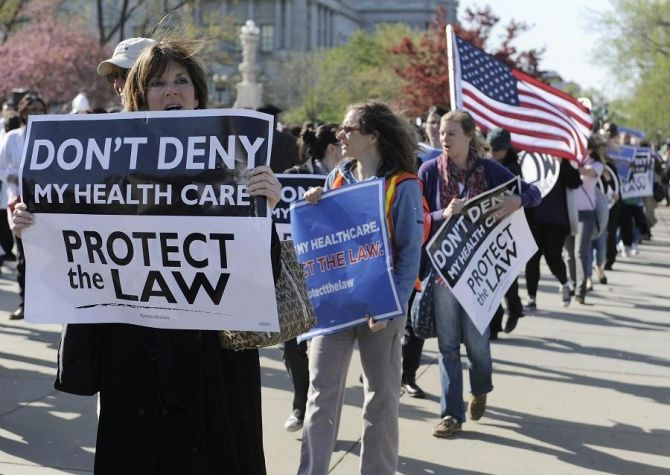Supreme Court Will Review Key Constitutional Issue in Healthcare Law

As the Supreme Court on Tuesday plans to hear oral arguments and consider a key element in President Barack Obama's historic health care overhaul that nearly all Americans must buy health insurance, or pay a fine starting in 2014.
Supporters of the individual mandate say the law is crucial for reducing the number of people living without health insurance, but critics say that the mandate is an example of government overreach that goes against civil liberties because Congress does not have the power to force people to buy health insurance.
Lawyers for individual plaintiffs represented by the National Federation of Independent Business and 26 states will argue that before the justices Tuesday morning. Many of the reform’s critics say that if the government can make citizens buy health insurance, it could also force people to eat broccoli, buy gym memberships and drive American cars.
Lawyers representing the Obama administration say that Congress has the authority to use the mandate, a key goal of the law that the president signed into law in March 2010, to regulate health insurance. They will argue that Americans who don’t have health insurance simply push their unpaid medical bills onto taxpayers, who are forced to subsidize emergency room visits.
While both sides of the case agree that without a mandate, main parts of the reform cannot stand, like the provision that guarantees coverage to people with preexisting medical conditions. The high court on Tuesday will consider whether Congress has the power to regulate industries, like health care, that affect people in many states.
If the mandate is passed, starting in 2014, most Americans will have to get a health insurance plan that meets a minimum set of standards or pay a tax penalty that will increase from $95 in 2014 to $695 in 2016, to up to $2,085 in 2016 for a family. The only people who are exempt from the mandate will be low-income Americans, Native Americans and those with religious objections to health coverage.
Many experts agree that guaranteeing medical coverage to everyone, as the new reform plans to do, is nearly impossible without a way to get younger, healthier people to get covered to balance the cost of insuring older, sicker people. They also agree that because the mandate must be in place because the law requires insurers to offer coverage to all people even those with preexisting medical conditions, and without a requirement for getting insurance, people could wait until they become seriously ill before they sign up for coverage.
Under the Constitution commerce clause, Congress has the power to “regulate commerce” or industries and to impose taxes to support general welfare. Previously the Supreme Court has upheld federal law regulating all types of big and small businesses. The administration argues that the new insurance requirements are a regulation of commerce and therefore well within Congress’ power.
However states and other plaintiffs will challenge by arguing that Americans who do not get coverage are not actually engaging in commerce, so therefore should be free from regulation by the federal government. They warn that the individual mandate a slippery slope, if government can regulate inactivity, like the decision to get health insurance, they can also regulate other consumer products.
Many legal experts believe that the court is likely to uphold the insurance mandate because since 1936, the Supreme Court has never struck down a major federal regulatory law on the grounds that Congress had exceeded its power. However the five conservative justices have also consistently voiced concern about excessive federal power, and no federal law has ever made it mandatory for Americans to buy a product.



























